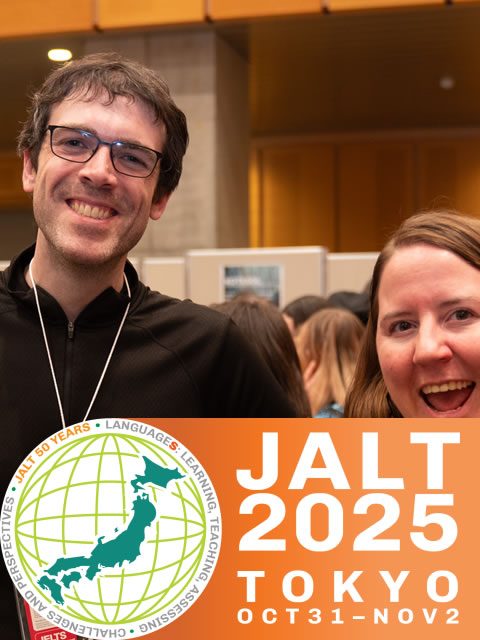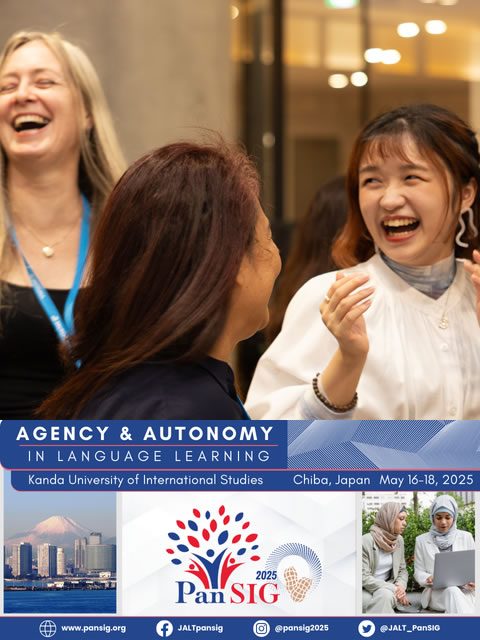Your cart is currently empty!
Pre-Conference Technology in Teaching (TnT) Workshops
•
Pre-Conference Technology in Teaching (TnT) Workshops
Friday, November 19, 1:00 pm – 6:30 pm
1:00-2:30 pm
Forrest Nelson: Managing student video quickly and easily
Jeff Durand: Course Management and Excel
Bob Gettings: An introduction to the Moodle course management system
3:00 – 4:30 pm
Daniel Beck: iPads, iPhones & Google for teaching and class management
Joseph Tomei & Sylvan Payne: QuickTime Pro and video for teachers
Paul Daniels: Multimedia & Moodle
5:00 – 6:30 pm
Todd Rucynski: Lights, camera, action: going pro on a budget (90 min)
Mark Shrosbree: Computer Skills for Language Teachers: Tips, Tricks and Techniques (45 min) & Charlie Robertson: Video slideshow writing projects (45 min)
Paul Collett: Getting online content to your students (45 min) & Bill Pellowe: Quiz and survey system for mobile devices (45 min)
Kevin Ryan: Building a PLE (Personal Learning Environment) for yourself and your students (90 min)
Managing student video quickly and easily
Forrest Nelson
(90 minutes)
Abstract: Video taping student classroom interactions is a very useful tool for self evaluation and motivation. However, it is time consuming and many teachers simply give up because of a lack of time. Therefore, in this workshop, participants will receive all shareware and freeware software that will vastly decrease the time it takes to deal with student video as well as training on how to use and implement this framework. For a better hands on training experience, it is suggested that participants bring either a Mac or PC laptop computer although Macs are preferable. Also participants who wish to create a framework for their language program or individuals who simply want to learn to deal with student video more quickly should attend.Bio: Forrest Mitchell Nelson is an Associate Professor at Tokai University located 1 hour south of Tokyo, Japan. His experience in technology for education has led him to experiment with different technologies that aid teachers in the classroom. Most recently, Forrest has been working on a framework for dealing with video recordings of student classroom conversation practice, student lead discussions and presentations. He is also looking at study experience in L2 and the role it plays in motivation and possible in streaming.
Course Management and Excel
Jeff Durand
(90 minutes)
Abstract: Computers can speed up common, repetitive tasks and do so without error. This workshop will show teachers how to use Excel (or other spreadsheet programs) to manage their courses more quickly and/or accurately. The topics covered include getting student names and IDs into Excel, keeping attendance, recording and calculating grades, and if time, creating groups of students. In creating their own attendance and grade sheets, participants will also learn about the basic functions in Excel that they can then use in their own creative ways.Bio: Jeffrey Durand, who currently teaches at Tokai University, has been using Excel and other spreadsheet programs for a variety of purposes. In addition to keeping track of course matters, he uses Excel for many research and statistical applications.
An introduction to the Moodle course management system
Bob Gettings
(90 minutes)
Abstract: This workshop will guide teachers through the basics of constructing an online course using an open source course management system called Moodle. After exploring a sample Moodle course, participants who bring along a wireless ready notebook computer will be able to set up and edit their own class page by uploading files or creating assignments, discussion forums, questionnaires and other Moodle activities. Bring your questions. We will focus on just what can and can’t be done easily in Moodle. Besides covering the basics, online resources for learning more about Moodle and how to get your questions answered by the worldwide Moodle community will be discussed. Options for Moodle hosting will also be reviewed.Bio: Bob Gettings has been teaching and learning for the last eighteen years with students at Hokusei Gakuen University Junior College, a traditional women’s junior college in Sapporo, recently with a focus on content-based teaching using Moodle and other online resources.
iPads, iPhones & Google for teaching and class management
Daniel Beck
(90 minutes)
Abstract: Smart phones and mobile devices have enabled teachers and students to bring the resources of the Internet into any classroom. No longer does the teacher (or students) need to be stuck behind a monitor while using technology. Google Docs and applications make it easy to use “the Cloud” to empower collaboration, instant portable assessment and time-shifted written interaction from almost any location. The presenter will explain the above terminology and demonstrate with an iPad and iPhone. Participants will have the opportunity to experiment with Google from their phones or devices. Check out the blog at http://tntjalt2010beck.blogspot.com
*Note: Other internet-enabled devices should be able to be used during the workshop, but the presenter may not be able to provide support (although fellow participants may).Bio: Daniel Beck is an English teacher, preacher, videographer, and social media geek who teaches full-time at Toyo Gakuen University’s Nagareyama campus near Tokyo. Follow him on twitter at http://twitter.com/gtb.
QuickTime Pro and video for teachers
Joseph Tomei & Sylvan Payne
(90 minutes)
Abstract: Have you ever wanted to make a video clip more accessible by adding some subtitles? Have you ever wanted to deliver via internet video materials for class that you had annotated? Have you wanted to organize your videos so that they could be presented with a minimum of fuss? In this workshop, we will be demonstrating the ins and outs of using QuickTime Pro for preparing videos for language classes, showing how you can add, organize and manipulate video, audio and text tracks using QuickTime Pro. While the presenters will be primarily using Mac computers, the software is also available in a Windows version, so the presentation will work to be platform agnostic. For participants to get the most out of this workshop, they should bring their laptops and have Quicktime pro installed (see http://www.apple.com/quicktime/extending/ for details)Bio: Sylvan Payne currently teaches at International Christian University and his teaching interests center around the adaptation of digital technology to language-learning resources, and his personal interests include bicycling, walking, reading, and people-watching.
Joseph Tomei is currently teaching at Kumamoto Gakuen University and he has been working with blogs for writing and scrolling text for increasing student reading speed. His personal interests are aikido and iaido, which he does too much of according to his wife and not enough of according to him. Together with Bill Perry, they are both working on a book to help teachers get the most out of QuickTime.
Multimedia & Moodle
Paul Daniels
(90 minutes)
Abstract: This workshop will introduce Moodle’s multimedia elements. The presenter will explain ways in which Moodle’s interactive and multimedia modules can be used to support language instruction by demonstrating a mobile integration module, a shared whiteboard, a voice recorder and a slide-show module. The presenter will also demonstrate how to download and install add on modules to to enhance the multimedia elements of Moodle. Participants who bring along a wireless ready notebook computer will be able to create a sample course and add multimedia activities to that course.Bio: Paul Daniels teaches English at Kochi University of Technology where he developed a unique project-based science English curriculum accessible to students through Moodle. He has designed over 20 modules to help support language learning in a Moodle environment. His open source Moodle modules can be downloaded from: http://moodlemodules.netcourse.org/ http://moodlemodules.netcourse.org/
Lights, camera, action: going pro on a budget
Todd Rucynski
(90 minutes)
Abstract: In the past decade the use of video in the L2 classroom has exploded. Advances in technology have made it possible for teachers to achieve what was previously only possible with a video crew and large budget. Nonetheless, care must be taken and plans made to assure that the video has the look and feel to keep students awake and encourage learning. This workshop will cover both various ways that video can be utilized in an L2 classroom and the tools necessary to make a quality project. The presenter will lead a discussion that will help participants get started on creating either their own commercial project or simply something new to energize their classroom.Bio: Todd Rucynski has been teaching at universities in Japan for 15 years and making professional video for the past seven. He specializes in guerrilla filming in New York where he believes the actors and locations to be unparallelled. Recently he produced the video for the Communication Spotlight series published by ABAX which was shot on location in Tokyo, New York, and Maui. His previous projects include: The Impact Issues series, Experience America!, which he co-authored, PTE in London, and the iZone series published by Pearson, Hong Kong in 2009. He is currently a full-time faculty at Tokai University and is the founder of Fluent Films. http://moodlemodules.netcourse.org/
Computer Skills for Language Teachers: Tips, Tricks and Techniques
Mark Shrosbree
(45 minutes)
Abstract: With the wide range of technologies now available, it can be difficult for teachers to choose applications which are suitable for their teaching situation. As a result, many teachers feel uncomfortable with technology, and avoid even the simple applications that can greatly enhance both course management and pedagogy. This workshop will introduce some simple ideas which require only basic computer skills. Depending on the requirements of participants, the following areas will be covered: attendance sheets; photo grading sheets; systems for pairing up students; simple video lessons; making handouts; poster presentations. The aim is to provide teachers with some practical skills they can take away from the workshop and apply immediately at work.Bio: Mark Shrosbree is a teacher at Tokai University in Kanagawa, Japan. He is interested in course design, methodology and materials development, for both general ESL courses and English for Specific Purposes (ESP). He maintains a personal website and several university homepages which hold many of the materials he has created. These materials are all freely available to other teachers, and are adaptable for a wide range of EFL courses.
Video slideshow writing projects
Charlie Robertson
(45 minutes)
Abstract: Maintaining learner motivation is a challenge faced by most teachers in the classroom. In an EFL context, one way of meeting this challenge is through the proper application of CALL technologies in support of pedagogically-sound approaches to language learning. In recent years, researchers have demonstrated how CALL can positively affect L2 learner motivation (Egbert, 2003; Fotos, 2004; Warschauer, 1996); moreover, other research has examined how Web 2.0 technologies, in particular, have helped to create motivating learning environments (Alm-Lequeux, 2004). For example, the inclusion of Blogging software into an L2 writing curriculum can help stimulate and narrow subjects of discussion into appropriate topics for writing assignments. Video posting sites, such as You Tube, can help showcase students’ original work, as well as create an opportunity to dialog with others about their work; thus, as Alm-Lequeux has argued, these technologies can help balance and promote notions of learner relatedness, competence and autonomy to create a more motivating learning experience.Bio: Charles Robertson is from Northern California. He holds an undergraduate degree in English Education and a master’s degree in Composition Studies (with an emphasis in L2 composition instruction and sociolinguistics) from Humboldt State University, Arcata, California. Research interests: L2 composition theory, project-based learning and content-based teaching. He is currently a full-time faculty member at Tokai University in Kanagawa Prefecture.
Getting online content to your students
Paul Collett
(45 minutes)
Abstract: The online world offers an endless stream of news, information, and entertainment that can be used in a myriad of ways in the classroom or other learning environments. Knowing how and where to access all this information, while filtering out unwanted or harmful content is something many students, as well as teachers, are often unfamiliar with. In this workshop, we will look at some straightforward ways to set up an online portal to help deliver online content from multiple online sources to your students, delivering a rich source of authentic language from the cloud to the crowd. Key concepts include RSS feeds, twitter, & javascript. The workshop will be suitable for those at a beginning level and up.Bio: Paul Collett teaches at Shimonoseki City University, and is the administrator of JALT’s internet services. He has contributed a number of articles on technology in teaching to various JALT publications, and presented on the topic at both national and chapter-based events.
Quiz and survey system for mobile devices
Bill Pellowe
(45 minutes)
Abstract: MOARS is a web-based student response system (SRS) for students to take quizzes and surveys through portable media devices such as iPod Touch and iPhones. In this 45-minute session, Bill will demonstrate how you can install this system on your own web server, and he’ll also give a quick overview of some of the features. If you’d like a head start, visit http://moars.com to download the system. What do you need? You’ll need some space on a basic “LAMP” web server (LAMP: Linux, Apache, MySQL, PHP). If you don’t already have this, Bill recommends http://linksky.com because of years of reliable service. Note: Bill is leading a forum on Saturday at 5:15 with other teachers who also use this system, so you’ll be able to follow up with some practical advice on using this with your students.Bio: Bill Pellowe is an English teacher and a web developer. Bill teaches full time at Kinki University in the Iizuka, Fukuoka branch campus. He runs ELT Calendar http://www.eltcalendar.com.
Building a PLE (Personal Learning Environment) for yourself and your students
Kevin Ryan
(90 minutes)
Abstract: As learning moves beyond Web 2.0 many of us start putting together a network of friends and experts to help with research and learning, a Personal Learning Network (PLN). Add a way to set up a personal learning profile, a way to aggregate (pull together) information and resources, tools to to edit and publish our own information, helper applications and services to fill the gaps, and a recommender to clear a path when we get lost or frustrated, and you have a PLE. We look at how to build one for our own use, and how to encourage students to do the same. Email tokyokevin [at] gmail.com if you need more specifics before you decide.Bio: Kevin Ryan has taught in Barcelona, Chicago, Nanjing and Tokyo over the 35 years of his career. Technology steered him in a new direction (CALL) in the late 80’s. He in in the process af reassessing the value of the Communicative Approach in Japan and is looking at a combination of complexity theory, dogme and PLEs as a replacement.

JALT2025 International Conference
2025年10月31日(金)〜2025年11月02日(日) 東京都渋谷 国立オリンピック記念青少年総合センター Friday, October 31 – Sunday, November 02, 2025 • National Olympics Youth Memorial Center, Tokyo, Japan

PanSIG Conference
PanSIG 2025 will be held May 16-18 in Chiba. PanSIG is an annual conference organized by JALT’s Special Interest Groups (SIGs).
